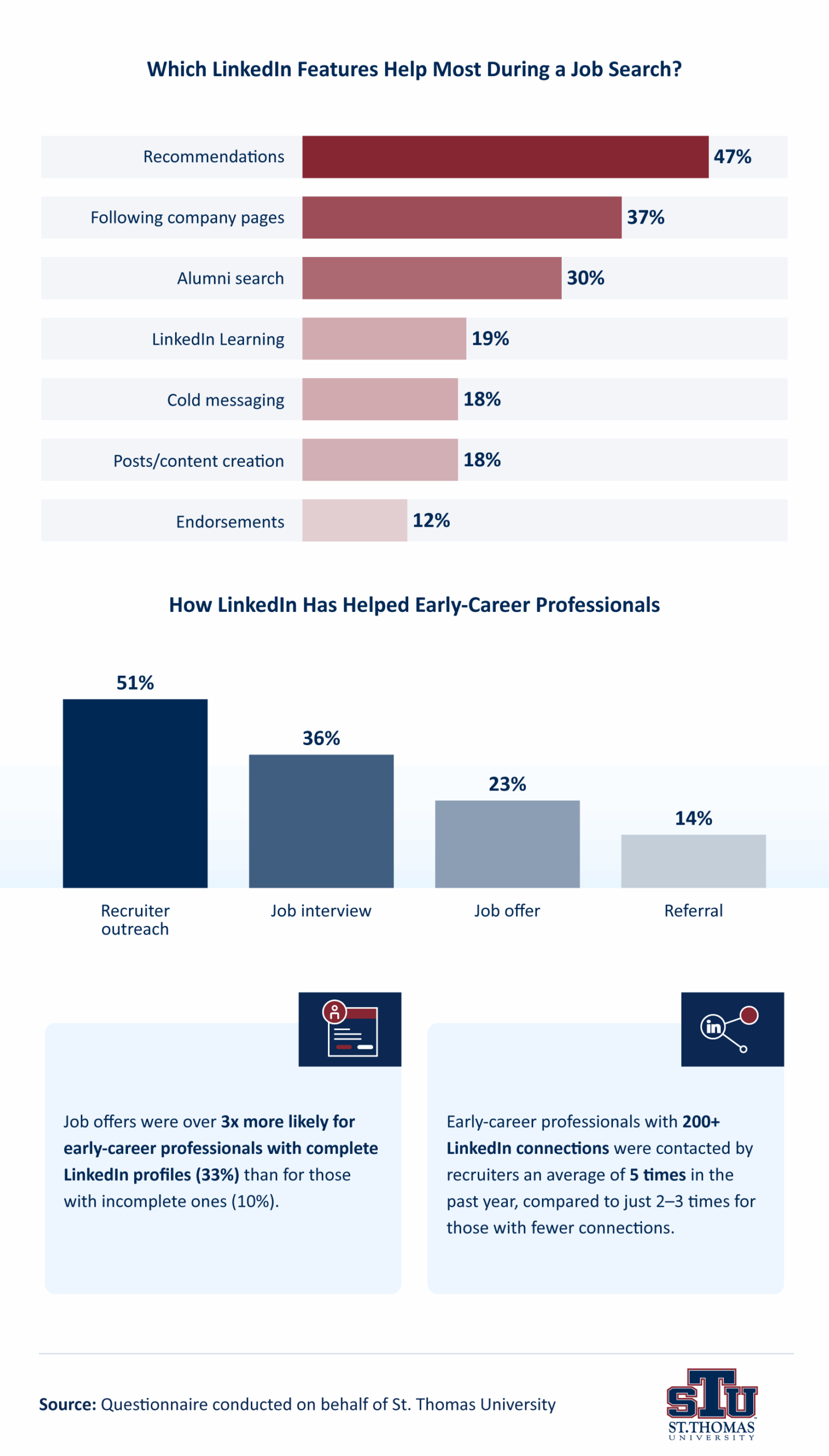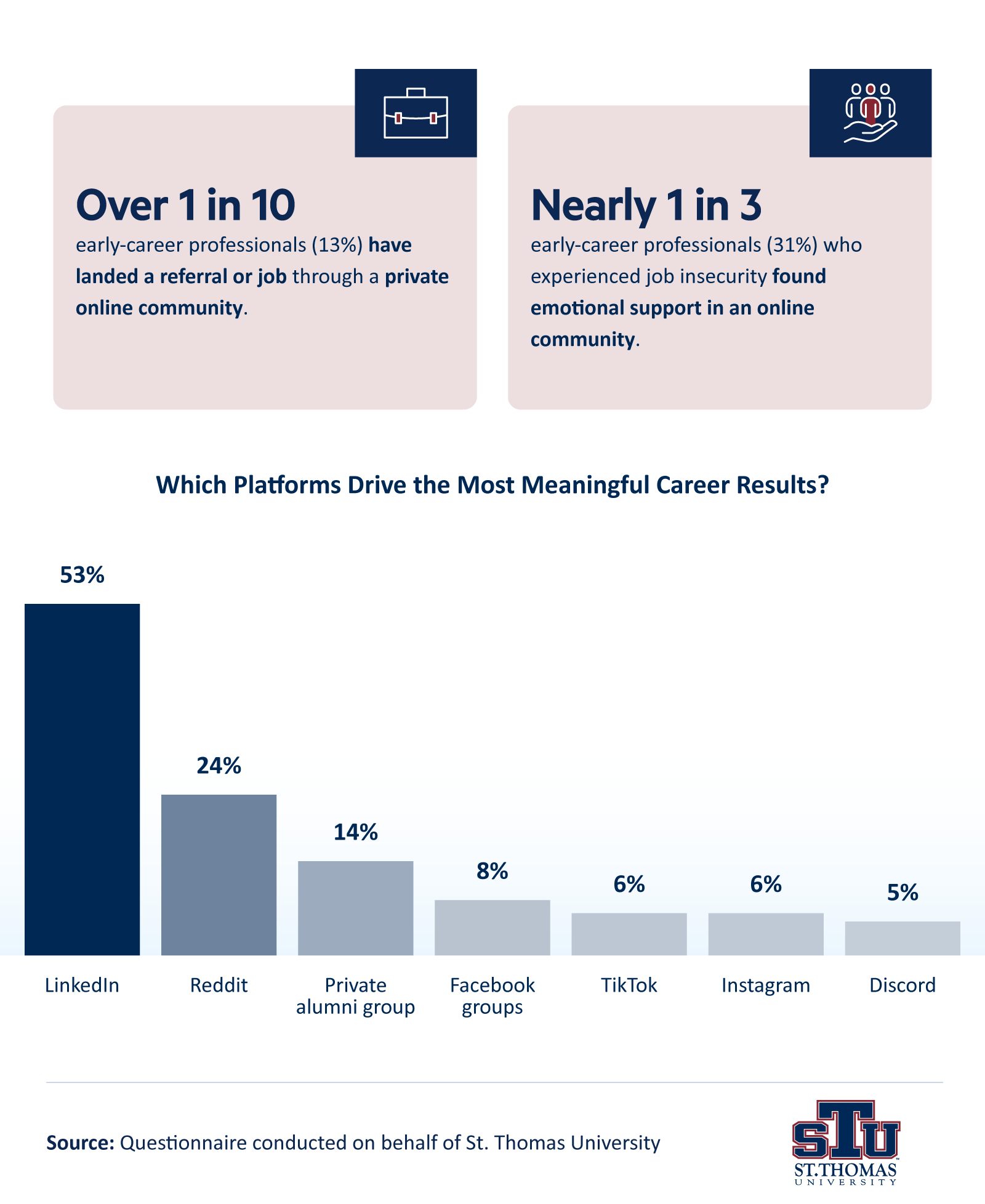
In today’s uncertain job market, a polished resume is only part of the equation. Early-career professionals are increasingly turning to digital tools like LinkedIn to stand out, stay connected and recover from layoffs. However, many job seekers likely wonder if these platforms actually help. A new questionnaire of 1,000 young professionals explores how online networking influences career outcomes, from recruiter outreach to emotional support, and which behaviors offer the biggest return.
Key Takeaways
- Job offers are over three times more likely for early-career professionals with fully completed LinkedIn profiles (33%) than for those with incomplete profiles (10%).
- Early-career professionals with 200+ LinkedIn connections are contacted by recruiters an average of five times annually, compared to just two to three times for those with fewer connections.
- More than one in five early-career professionals (22%) use AI-generated content to help write or optimize their LinkedIn profiles or posts.
- Over two in five early-career professionals (45%) believe a strong LinkedIn presence can help offset a resume gap caused by layoffs.
- Over one in 10 early-career professionals (13%) have landed a referral or job through a private online community.
How LinkedIn Profiles Influence Job Outcomes
A strong LinkedIn presence may help more than you think when it comes to landing job offers and attracting recruiters.

Early-career professionals with fully completed LinkedIn profiles were over three times more likely to receive a job offer than those with incomplete ones (33% vs. 10%). Having a broad network also made a difference. On average, those with 200 or more connections were contacted by recruiters five times per year, compared to just two to three times for those with fewer connections.
The advantage grew even more for those with expansive networks. Early-career professionals with 500+ LinkedIn connections were nearly twice as likely to receive a job offer (36%) compared to those with fewer than 200 connections (20%).
The most helpful LinkedIn features during job searches included:
- Recommendations (47%)
- Following company pages (37%)
- Using the alumni search tool (30%)
Additional benefits reported by users included recruiters reaching out (51%), landing job interviews (36%) and receiving direct job offers (23%).
For some, LinkedIn activity has even outweighed experience. Over 1 in 10 early-career professionals (16%) said their LinkedIn presence has mattered more to their job outcomes than their actual work history. Similarly, 45% believed a strong LinkedIn profile could help offset a gap in experience caused by a layoff.
Yet, the platform also comes with pressures. More than 1 in 3 early-career professionals (35%) have felt pressured to post just to appear “active” during a job hunt, even when it didn’t feel authentic. Nearly 1 in 3 (30%) have avoided posting about their job status out of fear it would make them seem less hirable.
Online Activity, AI and the Role of Digital Communities
Digital networking behaviors go beyond profile polish. From AI-generated posts to emotional support during layoffs, today’s professionals are navigating the job hunt in new ways.

AI is playing a growing role in online branding, with 22% of respondents using AI tools to write or optimize their LinkedIn content. Of those, 45% posted in the afternoon between 12 p.m. and 5 p.m.
Beyond LinkedIn, other platforms offered tangible benefits. Over one in 10 respondents (13%) landed a referral or job through a private online community. Nearly one in five found emotional support online during a layoff or job insecurity, and 31% of those with job instability said online communities helped them cope.
When asked which platforms delivered the strongest career results, LinkedIn led at 53%, followed by Reddit (24%) and private alumni groups (14%). For emotional safety during difficult periods, Reddit again topped the list at 38%, with TikTok (21%), Instagram (20%) and LinkedIn (19%) close behind. Discord, Twitter, Facebook groups and alumni networks were also mentioned, each by fewer than 15% of respondents.
Looking ahead, many professionals are investing in their digital presence as a buffer against future disruption. Twenty-nine percent said they proactively boosted their online presence over the past year to build a “career cushion” amid job market uncertainty.
A New Era of Networking
A polished LinkedIn profile and active online presence can do more than get you noticed in today’s competitive job market. They can directly influence job offers, recruiter outreach and your ability to bounce back after a layoff. For early-career professionals, the numbers show that building strong networks, posting thoughtfully and using tools like AI can make a real difference in career outcomes.
The key is to be intentional. Posting just to look active often feels hollow, while genuine engagement and consistent updates help turn online connections into real opportunities. As more career moves happen online, investing in a presence that reflects who you are and what you offer is an important step toward navigating change and opening doors to your next big opportunity.
Methodology
A questionnaire of 1,000 early-career American professionals was conducted on behalf of St. Thomas University to explore whether a strong digital professional network, especially on LinkedIn, meaningfully improves job outcomes for early-career workers navigating layoffs. Respondents were sourced using CloudResearch Connect. The average age of respondents was 25; 54% were women, 55% were men and 2% were non-binary. Due to rounding, some percentages may not total exactly 100%.
This is a non-scientific, exploratory questionnaire designed to explore behavioral and attitudinal trends. It is not intended to represent all MBA students.
About St. Thomas University
St. Thomas University offers online degree programs designed for students who want the flexibility to learn from anywhere while advancing their careers. STU’s online MBA programs help students develop advanced business skills, connect with faculty and peers virtually and balance their education with work and personal commitments.
Fair Use Statement
This content is for educational and noncommercial use only. If you share or reference this article, please link back to St. Thomas University and provide proper attribution.